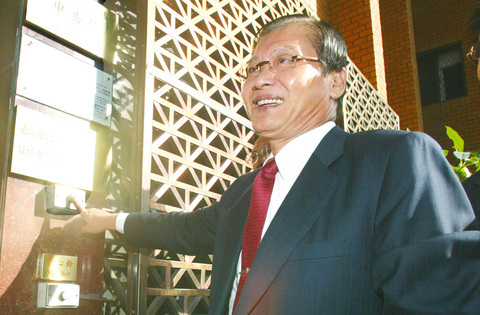The People First Party (PFP) caucus yesterday proposed amending the law to empower lawmakers to exercise the right of investigation, including summoning the president, in order to probe the Kaohsiung Rapid Transit Corp (KRTC) scandal.
PFP caucus whip Hwang Yih-jiau (黃義交) said the caucus plans to file a motion during the Nov. 8 session to amend the Law Governing Legislators' Exercise of Power (立法院職權行使法) and push the amendment through to a second reading.
Hwang said the caucus has obtained the consent of Legislative Speaker Wang Jin-pyng (王金平) and endorsement of the Chinese Nationalist Party (KMT) caucus to forge ahead with the proposal.

PHOTO: CNA
The recent wave of scandals surrounding President Chen Shui-bian's (
Both the president and former Presidential Office deputy secretary-general Chen Che-nan (陳哲男) could be called to the legislature for questioning about their roles in the KRTC scandal after the amendment passes, Hwang said.
In response, the pan-green caucuses called on the PFP to support the confirmation of the president's Control Yuan nominees.
Democratic Progressive Party (DPP) caucus whip Jao Yung-ching (
Although lawmakers have the power to summon civil servants and question them during the process of legislation or budget review, Jao said they must not abuse the right by trying to usurp the role of prosecutors.
DPP Legislator Gao Jyh-peng (
Taiwan Solidarity Union (TSU) caucus whip David Huang (
Another TSU caucus whip, Legislator Kuo Lin-yung (郭林勇), said that although the Council of Grand Justices has ruled that lawmakers are entitled to exercise the right of investigation, it also ruled that such a practice must not violate the principle of separation of powers among branches of government.
Meanwhile, in response to media reports that Chen Che-nan and Chen Min-hsien (陳敏賢), former KRTC vice chairman were spotted sitting together at a casino table in a Seoul hotel on Nov. 2, 2002, the Presidential Office said it had no record of Chen Che-nan having asked for leave or traveling overseas in November 2002.
There had also never been any "inspection report on the foreign labor situation" allegedly presented to the president by Chen Che-nan, said Chen Wen-tsung (
Chen Min-hsien said yesterday that he and Chen Che-nan did tour South Korea's Cheju Island in November 2002. He said the recent media reports only prove that the two men were "enjoying a legal recreational activity."
"Chen Che-nan and I are good friends. We went to a recreational area, purely for tourism. It's nothing. It has nothing to do with the KRTC scandal," he said.
Chen Che-nan issued a statement to the press last night admitting that he had made a trip to South Korea at the time in question. He apologized for visiting Cheju on a working day without notifying his superiors, but he reiterated that he was not involved in the KRTC scandal.
KMT Chairman Ma Ying-jeou (馬英九) said yesterday that he "was not surprised at all" by the new evidence that has come out after the Kaohsiung City Government released its investigation report on the scandal.
He said the opposition parties hope there won't be any obstacles to future's investigations by prosecutors and courts.
In a related development, Chao Yu-chu (
Chiu has claimed that Chen Che-nan went to Thailand in November last year with a "retired school principal who is closely related to the Presidential Office" and that the principal is an "influential figure" in the KRTC scandal.
Chao Yu-chu is a retired principal.
Additional reporting by Mo Yan-chih

Beijing could eventually see a full amphibious invasion of Taiwan as the only "prudent" way to bring about unification, the US Department of Defense said in a newly released annual report to Congress. The Pentagon's "Annual Report to Congress: Military and Security Developments Involving the People's Republic of China 2025," was in many ways similar to last year’s report but reorganized the analysis of the options China has to take over Taiwan. Generally, according to the report, Chinese leaders view the People's Liberation Army's (PLA) capabilities for a Taiwan campaign as improving, but they remain uncertain about its readiness to successfully seize

Taiwan is getting a day off on Christmas for the first time in 25 years. The change comes after opposition parties passed a law earlier this year to add or restore five public holidays, including Constitution Day, which falls on today, Dec. 25. The day marks the 1947 adoption of the constitution of the Republic of China, as the government in Taipei is formally known. Back then the Chinese Nationalist Party (KMT) governed China from Nanjing. When the KMT, now an opposition party in Taiwan, passed the legislation on holidays, it said that they would help “commemorate the history of national development.” That

Trips for more than 100,000 international and domestic air travelers could be disrupted as China launches a military exercise around Taiwan today, Taiwan’s Civil Aviation Administration (CAA) said yesterday. The exercise could affect nearly 900 flights scheduled to enter the Taipei Flight Information Region (FIR) during the exercise window, it added. A notice issued by the Chinese Civil Aviation Administration showed there would be seven temporary zones around the Taiwan Strait which would be used for live-fire exercises, lasting from 8am to 6pm today. All aircraft are prohibited from entering during exercise, it says. Taipei FIR has 14 international air routes and

The Ministry of National Defense (MND) today released images of the military tracking China’s People's Liberation Army (PLA) movements during the latest round of Chinese drills around Taiwan. The PLA began "Justice Mission 2025" drills today, carrying out live-fire drills, simulated strikes on land and maritime targets, and exercises to blockade the nation's main ports. The exercises are to continue tomorrow, with the PLA announcing sea and air space restrictions for five zones around Taiwan for 10 hours starting from 8:30am. The ministry today released images showing a Chinese J-16 fighter jet tracked by a F-16V Block 20 jet and the